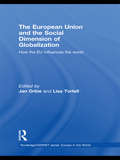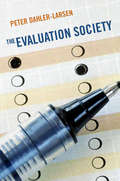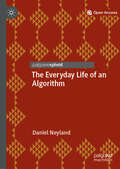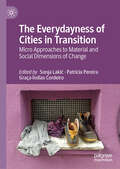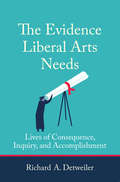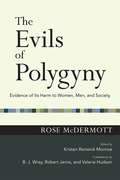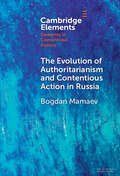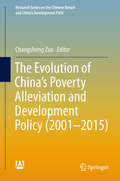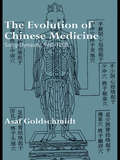- Table View
- List View
The European Union and the Kurdish Issue: The EU as a Rational and Normative Actor (United Nations University Series on Regionalism #23)
by Zana A. KurdaThis book focuses on the European Union as an actor involved in the transnational Kurdish issue covering Turkey, Iran, Iraq and Syria. It demonstrates that, instead of being simply a humanitarian actor in the issue, the EU has considered its bilateral interests with the four states in question as well as its extent of acceptance in approaching the Kurdish issue. It has combined its traditional humanitarian/normative consideration with its geopolitical interests in relation to strategies related to the four states. This book provides a unique perspective on the EU as an actor in the Kurdish issue and from a wider perspective, it provides interesting insights into the EU’s interactions with geopolitics, which has become the topic of a lively scholarly debate in recent years. The book is a resource for researchers and students studying the European Union as a global actor, and for governmental or non-governmental professionals dealing directly with, or having interest in, the EU and/or Kurdish affairs.
The European Union and the Paradox of Enlargement: The Complex Accession of the Western Balkans (Palgrave Studies in European Political Sociology)
by Tatjana SekulićThis book sheds light on the contradictions underlying the European Union enlargement process, specifically to the Western Balkans, challenging the common assumption that the integration of an extended European space might be possible without mutual transformation of the institutions and agencies involved. Sekulić maps the institutional dimension of the accession process, and analyses how the conditionality principle shapes and constrains the space for negotiation within the EU. Combining ethnographic research with the discourse analysis of the European Commission’s reports and documents from 2008 to 2019 concerning the Western Balkan countries, the book also explores the perceptions and agency of the individuals involved in this process. The European Union and the Paradox of Enlargement will be of interest to students and scholars of European integration, the sociology of Europe and the EU, and Eastern European and Western Balkan studies.
The European Union and the Social Dimension of Globalization: How the EU Influences the World (Routledge/GARNET series)
by Jan Orbie Lisa TortellThis volume provides a comprehensive account of the European Union’s social role in the world, assessing the EU’s ability to shape the social aspect of globalization from both law and political science perspectives. Focusing explicitly on the EU, the authors address the extent of coherence between the Union’s international social objectives compared with the activities of the International Labour Organization (ILO) and with other EU foreign policy goals. Various dimensions of Europe’s global social role are addressed, including: the social dimension of EU trade relations the involvement of civil society in EU development policies the linkage between the EU’s internal and external ‘social model’ the export of Europe’s social acquis through enlargement and neighbourhood policies the EU’s international position on health, gender equality, children’s rights, and corporate social responsibility the role of the Union in the ILO The European Union and the Social Dimension of Globalization will be of strong interest to students and researchers in EU studies, Globalization studies, and Social Policy.
The European Union as a Small Power
by Asle TojeThe post-Cold War period is coming to an end. After a decade of foreign policy integration Europe faces multipolarity internally divided and externally weak. Toje argues that due to the lack of a workable decision-making mechanism the EU is destined to play the limited but distinct role of a small power in global politics.
The European Yearbook of Business History (Routledge Revivals)
by T. R. GourishThis title was first published in 2001. A collection of research and review articles, in English, on the history of private enterprise based in European countries, as well as studies of transnational, public and state corporations. The period of interest covers the 19th and 20th centuries.
The Europeanisation of National Foreign Policy: Dutch, Danish and Irish Foreign Policy in the European Union
by Ben TonraThis title was first published in 2001. This study questions whether the development of foreign and security policy co-operation within the EU has constrained or empowered Danish, Dutch and Irish foreign policy. This entails a study of the relationship between national foreign policy and EU frameworks for co-operation.
The Evaluation Society
by Peter Dahler-LarsenEvaluation—whether called by this name, quality assurance, audit, accreditation, or others—is an important social activity. Any public or private organization that "lives in public" must now evaluate its activities, be evaluated by others, or evaluate others. What are the origins of this wave of evaluation? And, what worthwhile results emerge from it? The Evaluation Society argues that if we want to understand many of the norms, values, and expectations that we, sometimes unknowingly, bring to evaluation, we should explore how evaluation is demanded, formatted, and shaped by the two great principles of social order: "organization" and "society." With this understanding, we can more conscientiously participate in evaluation processes; better position ourselves to understand many of the mysteries, tensions, and paradoxes in evaluation; and most effectively use evaluation. After exploring the sociology and organization of evaluation in this landmark work, author Peter Dahler-Larsen concludes by discussing issues that are critical for the future of evaluation—as a discipline and a societal norm.
The Event of Psychopoetics: Imagination and the Rupture of Psychology (Concepts for Critical Psychology)
by Raúl GarcíaThe Event of Psychopoetics overviews and investigates the notion of psychopoetics, a sociopsychological event that involves re-creative slips and that emerges under certain cultural conditions and power relations in the context of everyday interaction and through certain modes of dialoguing and conversing. This transdisciplinary text takes the reader through the thought processes of Deleuze, Guattari, Agamben, Maffesoli, Foucault, Butler, Haraway, and Braidotti, among others, addressing debates that are integral to the critique of psychology and its devices of subjectivization and normalization. Garcia takes a unique approach by reflecting on how psychopoetics contrasts institutionalized dialogues, while constantly emphasizing the generative and transformative potency of social worlds effectuated in the impetuous play of poetics. The book combines the rigor of academic research with the creative display of ideas that open diverse, suggestive lines of reflection on everyday interlocution and its possibilities of reinvention, modes of social existence, and the relation between subjectivity and the designs of power. A truly unique reading experience, this book is ideal for students, instructors, and researchers in the fields of philosophy, social psychology and sociological thought, discourse studies, literary theory, and cultural analysis.
The Event of the Thing
by Michael MarderJacques Derrida's writings often embed the key themes of deconstruction in a notion of the thing. The Event of the Thing is the most complete examination to date of Derrida's understanding of thinghood and its crucial role in psychoanalysis, ethics, literary theory, aesthetics, and Marxism. Arguing that the thing, as a figure of otherness, destabilizes the metaphysical edifice it underlies, Michael Marder reveals the contributions it makes to critiques of humanism and idealism. Subsequently, the new realism that emerges from deconstruction holds the possibility of an event that problematizes all attempts to objectify the thing. An illuminating analysis of Derrida and phenomenology, The Event of the Thing is an innovative and compelling study of a crucial aspect of one of the twentieth century's greatest thinkers.
The Everyday Life of an Algorithm
by Daniel NeylandThis open access book begins with an algorithm–a set of IF…THEN rules used in the development of a new, ethical, video surveillance architecture for transport hubs. Readers are invited to follow the algorithm over three years, charting its everyday life. Questions of ethics, transparency, accountability and market value must be grasped by the algorithm in a series of ever more demanding forms of experimentation. Here the algorithm must prove its ability to get a grip on everyday life if it is to become an ordinary feature of the settings where it is being put to work. Through investigating the everyday life of the algorithm, the book opens a conversation with existing social science research that tends to focus on the power and opacity of algorithms. In this book we have unique access to the algorithm’s design, development and testing, but can also bear witness to its fragility and dependency on others.
The Everyday Politics of Migration Crisis in Poland: Between Nationalism, Fear and Empathy
by Krzysztof JaskulowskiThis book explores attitudes towards migrants and refugees from North Africa and the Middle East during the so-called migration crisis in 2015-2016 in Poland. Beginning with an examination of Polish government policy and the discursive construction of refugees in the media, politics and popular culture, it argues that they identified refugees with Muslims, who were deemed to pose a threat to the Polish nation. This analysis establishes the Islamophobic public discourse which is shown to be variously reproduced, negotiated and contested in the nuanced study of Polish attitudes which follows. Drawing on original qualitative research and constructivist theory, the book examines differing stances towards refugees in the context of the lay understanding of the Polish nation and its boundaries. In doing so it demonstrates the influence of discourses that draw on an exclusionary concept of national identity and the potential for them to be mobilised against immigrants. This timely, theory-based case study will provide a valuable resource for students and scholars of Central and Eastern European politics, nationalism, race, migration and refugee studies.
The Everyday Practice of Valuation and Investment: Political Imaginaries of Shareholder Value
by Horacio OrtizThe financial industry derives its legitimacy through the claim that it acts in the interest of shareholders. A vast international network of funds, banks, insurance companies, brokerages, rating agencies, and regulatory agencies defends its status by asserting that market mechanisms determine a company’s true value and therefore enriching shareholders contributes to the socially optimal allocation of capital. Is this how stock prices are determined in practice? What does stock valuation reveal about the supposed efficiency of markets and what it means to act on behalf of shareholders?Horacio Ortiz provides a critical analysis of the social institutions and practices that produce and regulate stock pricing and valuation. He examines how financial professionals evaluate and invest in listed companies, unraveling the contradictory definitions of financial value that shape their behavior. Ortiz demonstrates how ideologically laden notions of investing skill and efficient markets are central to the everyday practices of financial valuation, as well as how they function to justify the broader system. He scrutinizes the technical aspects of valuation and investment, their place in social relations within and among companies, and their relation to state regulation in order to demystify how the financial industry presents prices as truths that the rest of society must accept.Drawing on ethnographic fieldwork conducted among stock brokers and investment management companies in New York and Paris, this book shows how the political imaginaries that underpin financial markets are central to producing, sustaining, and legitimizing global inequalities.
The Everydayness of Cities in Transition: Micro Approaches to Material and Social Dimensions of Change
by Patrícia Pereira Sonja Lakić Graça Índias CordeiroBuilding on the notion of everyday(ness) as a conceptual tool and a study object in urban research, this book presents 10 case-studies describing and questioning how cities and urban spaces are lived, experienced, interpreted, (self-)produced and/or appropriated. The chapter authors (Raffael Beier & Soufiane Chinig; Patrícia Pereira; Frédéric Vidal, Elisa Lopes da Silva & Alexandre Vaz; Priscilla Santos; Graça Cordeiro & Giuseppe Formato; Andrzej Bukowski & Marta Smagacz-Poziemska; Ryanne Flock; Sophie Zviadadze; Rita Cachado; and Sonja Lakić) analyse the dynamic/interchangeable relationship between material and social dimensions of urban change through thought-provoking ethnographic narratives.
The Everything Freemasons Book: Unlock the Secrets of This Ancient And Mysterious Society! (Everything® Series)
by Barb Karg John K YoungFor thousands of years, one clandestine organization has been rumored to control the destinies of men, cities, even nations: Freemasonry. Often traced back to the stonemason guilds of the Middle Ages, Freemasons were supposedly to be found among all the great minds of the Renaissance, including Da Vinci. The Freemasons have claimed such illustrious personages as Mozart, Benjamin Franklin, Darwin, FDR, Churchill, W.C. Fields, Herbert Hoover, and many others as members. Even today, Freemasonry boasts Masonic lodges all over the globe. The Everything Freemasons Book examines all the aspects of this fascinating organization, including: -myths, legends, and stories of this ancient order—what&’s true and what&’s not -the closely guarded secret rituals, symbols, and esoteric arts -the Freemasons&’ enemies—from the Catholic Church to the Nazis -the many controversies surrounding this secret society—past and present
The Everything Fundraising Book: Create a Strategy, Plan Events, Increase Visibility, and Raise the Money You Need (Everything® Series)
by Richard Mintzer Sam FriedmanThe Everything Fundraising Book makes fundraising easy with step-by-step instruction and advice from the experts. Whether you are a community volunteer or a professional fundraiser, this clear and practical guide shows you exactly how to set goals, create a plan, and tap into a financial goldmine of corporate and government endowments.Features timely information on how to:budget your fundraiser and cover expensesattract and work with volunteerschoose and organize campaigns and eventsuse corporate fundraisers to increase visibilitypitch to reluctant donors and sponsorsand more!Experienced fundraisers Rich Mintzer and Sam Friedman walk you through the process and help you avoid the pitfalls, so you can focus all your energy on reaching your fundraising goals.
The Everything Guide to Customer Engagement: Connect with Customers to Build Trust, Foster Loyalty, and Grow a Successful Business
by Linda PophalExpert advice and strategies for winning--and keeping--customers!Apple, L.L. Bean, Zappos.com, Nordstrom, Lego, Southwest Airlines. All of these extraordinarily successful businesses have one thing in common: They have famously loyal customers. These companies understand that customer engagement is just as important as quality products and services when it comes to customer loyalty and retention. With The Everything Guide to Customer Engagement, you can learn the highly successful strategies that have been working for business all over the world. Inside, you'll find essential information on how you can better:Reach customers in person and onlineCreate a communityBuild your social media presenceBring in new businessGrow your reputation It doesn't matter if your business is large, medium, or small. With this guide, you'll learn the tips and techniques to make your customers and their priorities your number one focus, now and in the future.
The Everything Store: Jeff Bezos and the Age of Amazon
by Brad StoneThe definitive story of Amazon.com, one of the most successful companies in the world, and of its driven, brilliant founder, Jeff Bezos.Amazon.com started off delivering books through the mail. But its visionary founder, Jeff Bezos, wasn't content with being a bookseller. He wanted Amazon to become the everything store, offering limitless selection and seductive convenience at disruptively low prices. To do so, he developed a corporate culture of relentless ambition and secrecy that's never been cracked. Until now. Brad Stone enjoyed unprecedented access to current and former Amazon employees and Bezos family members, giving readers the first in-depth, fly-on-the-wall account of life at Amazon. Compared to tech's other elite innovators--Jobs, Gates, Zuckerberg--Bezos is a private man. But he stands out for his restless pursuit of new markets, leading Amazon into risky new ventures like the Kindle and cloud computing, and transforming retail in the same way Henry Ford revolutionized manufacturing.THE EVERYTHING STORE will be the revealing, definitive biography of the company that placed one of the first and largest bets on the Internet and forever changed the way we shop and read.
The Evidence Liberal Arts Needs: Lives of Consequence, Inquiry, and Accomplishment
by Richard A. DetweilerEmpirical evidence for the value of a liberal arts education: how and why it has a lasting impact on success, leadership, altruism, learning, and fulfillment.In ongoing debates over the value of a college education, the role of the liberal arts in higher education has been blamed by some for making college expensive, impractical, and even worthless. Defenders argue that liberal arts education makes society innovative, creative, and civic-minded. But these qualities are hard to quantify, and many critics of higher education call for courses of study to be strictly job-specific. In this groundbreaking book, Richard Detweiler, drawing on interviews with more than 1,000 college graduates aged 25 to 65, offers empirical evidence for the value of a liberal arts education. Detweiler finds that a liberal arts education has a lasting impact on success, leadership, altruism, learning, and fulfillment over a lifetime. Unlike other defenders of a liberal arts education, Detweiler doesn&’t rely on philosophical arguments or anecdotes but on data. He developed a series of interview questions related to the content attributes of liberal arts (for example, course assignments and majors), the context attributes (out-of-class interaction with faculty and students, teaching methods, campus life), and the purpose attributes (adult life outcomes). Interview responses show that although both the content of study and the educational context are associated with significant life outcomes, the content of study has less relationship to positive adult life outcomes than the educational context. The implications of this research, Detweiler points out, range from the advantages of broadening areas of study to factors that could influence students&’ decisions to attend certain colleges.
The Evils of Polygyny: Evidence of Its Harm to Women, Men, and Society (The Easton Lectures)
by Rose McDermottWhy do men act violently toward women?What are the consequences of "normal violence," not only for women and children but also for the men who instigate it, and for the societies that sanction it?The Evils of Polygyny examines one powerful structural factor that instigates, enforces, and replicates patterns of male dominance: the practice of polygyny. From more than a decade’s worth of study, Rose McDermott has produced a book that uncovers the violent impact of polygyny on women, children, and the nation-state and adds fundamentally to the burgeoning focus on gender concerns in political psychology and international relations. Integrating these fields, as well as domestic policy and human rights, the author urges us to address the question of violence toward women and children. If we do not, a system that tells young women they must marry whom their elders dictate and devote their entire lives to serving others will continue to plague the contemporary world, and restrict development.The timely nature of McDermott’s book reflects the mission of the Easton Lectures at the Interdisciplinary Center for the Scientific Study of Ethics and Morality at the University of California, Irvine, which charges its lecturers to produce work that is creative, controversial, and cutting-edge, and offers substantial real-world impact. The Evils of Polygyny, edited by Kristen Renwick Monroe, includes commentary from Valerie Hudson, Robert Jervis, and B. J. Wray. The book does just that, providing a coherent analysis of sexual violence and a provocative and chilling analysis of one of the major problems of the contemporary world.
The Evolution Of U.s. Army Nuclear Doctrine, 1945-1980
by John P RoseThe development of U.S. Army nuclear doctrine—policies, plans, procedures, tactics, and techniques—since World War II, its impact on Army forces, and its role in future wars is the subject of this policy-oriented analysis. The definition of Army nuclear doctrine advanced by the author clearly implies a distinction between policy for the employment of nuclear weapons as determined by the president and the role adduced by the Army. Dr. Rose suggests that developments—both nuclear and conventional—in U.S. Army tactical doctrine have been more responsive to political preferences held by national authorities than to the real nature of the potential threat and rigors of the nuclear battlefield. Further, he argues that the type of war preparations favored by U.S. political authorities over the last fifteen years and the type of war for which the Soviet Union is preparing differ markedly, making the U.S. Army poorly prepared for a major war.
The Evolution of Authoritarianism and Contentious Action in Russia (Elements in Contentious Politics)
by Bogdan MamaevThis Element examines the evolution of authoritarianism in Russia from 2011 to 2023, focusing on its impact on contentious action. It argues that the primary determinant of contention, at both federal and regional levels, is authoritarian innovation characterized by reactive and proactive repression. Drawing on Russian legislation, reports from human rights organizations, media coverage, and a novel dataset of contentious events created from user-generated reports on Twitter using computational techniques, this Element contributes to the understanding of contentious politics in authoritarian regimes, underscoring the role of authoritarianism and its innovative responses in shaping contentious action.
The Evolution of China's Poverty Alleviation and Development Policy (Research Series on the Chinese Dream and China’s Development Path)
by Changsheng ZuoThis book explains in simple language the change of perspective and the transition of the systems for poverty alleviation, based on the fifteen-year development of China’s poverty alleviation policy. Written by scholars from the International Poverty Reduction Center in China, Peking University and the China Agricultural University who have been engaged in the field of poverty alleviation for many years, the contributions combine views on China's poverty reduction policy with the authors’ personal experiences. It is a valuable reference resource for researchers at the forefront of poverty alleviation and also appeals to anyone interested in poverty alleviation and China’s poverty alleviation changes.
The Evolution of China’s Anti-Poverty Strategies: Cases of 20 Chinese Changing Lives
by William N. BrownThis open access book presents the findings of the author’s 3 decades of studying China’s evolving anti-poverty strategies. It argues that much of the billions that nations spend yearly on economic aid is used inefficiently or to treat the symptoms but not the root causes of poverty. China, however, has evolved an effective sustainable alternative by providing the means for self-reliance to not only relieve economic poverty but also poverty of spirit. As a result, the success of China’s historic war on poverty has been due not only to top-down visionary leadership but also to the bottom-up initiatives of an empowered populace unswervingly united in ending poverty.From 1993 to 2019, the author drove over 200,000 km around China and interviewed hundreds of people from all walks of life as he explored the evolution of China’s anti-poverty strategies from simplistic aid and redistribution, which often engendered dependency and poverty of spirit. Over time, the philosophy shifted to empowerment by fostering self-reliance—or as Chinese put it, “blood production rather than blood transfusion.” The primary method of empowerment was to provide modern infrastructure, “Roads first, then riches,” so rural dwellers in remote Inner Mongolia or the Himalayan heights of Tibet had the same access to markets, jobs and internet for e-commerce as their urban counterparts. People who seized the opportunities and prospered first then used their newfound wealth and experience to help others.The stories in this book include a Tibetan entrepreneur whose family was impoverished in spite of 300 years of service to the Panchen Lama, or the farm girl with 4 years of education who now has several international schools, a biotechnology company and poverty alleviation projects across China, or the photographer who walked 40,000 km through deserts to chronicle the threat of desertification. Their tales underscore how diverse people across China helped make possible China’s success in alleviating absolute poverty and why Chinese are now confident in achieving a “moderately prosperous society.”
The Evolution of Chinese Filiality: Insights from the Neurosciences
by Deborah Lynn PorterThis unique book brings a fresh interdisciplinary approach to the analysis of ancient Chinese history, creating a historical model for the emergence of cultural mainstays by applying recent dramatic findings in the fields of neuroscience and cultural evolution. The centrality in Chinese culture of a deep reverence for the lives of preceding generations, filial piety, is conventionally attributed to Confucius (551-479 B.C.), who viewed hierarchical family relations as foundational for social order. Here, Porter argues that Confucian conceptions of filiality themselves evolved from a systemized set of behaviors and thoughts, a mental structure, which descended from a specific Neolithic mindset, and that this psychological structure was contoured by particular emotional conditions experienced by China’s earliest farmers. Using case study analysis from Neolithic sky observers to the dynastic cultures of the Shang and Western Zhou, the book shows how filial piety evolved as a structure of feeling, a legacy of a cultural predisposition toward particular moods and emotions that were inherited from the ancestral past. Porter also brings new urgency to the topic of ecological grief, linking the distress central to the evolution of the filial structure to its catalyst in an environmental crisis. With a blended multidisciplinary approach combining social neuroscience, cultural evolution, cognitive archaeology, and historical analysis, this book is ideal for students and researchers in neuropsychology, religion, and Chinese culture and history.
The Evolution of Chinese Medicine: Song Dynasty, 960–1200 (Needham Research Institute Series)
by Asaf GoldschmidtThe history of Chinese medicine hinges on three major turning points: the formation of canonical theory in the Han dynasty; the transformation of medicine via the integration of earlier medical theories and practices in the Song dynasty; and the impact of Western medicine from the nineteenth century onwards. This book offers a comprehensive overview of the crucial second stage in the evolution of Chinese medicine by examining the changes in Chinese medicine during the pivotal era of the Song dynasty. Scholars often characterize the Song era as a time of change in every aspect of political, social, intellectual or economic life. More specifically it focuses on three narratives of change: the emperor's interest in medicine elevated the status of medicine in the eyes of the elite, leading to an increased involvement of intellectuals and the literary elite in medicine government officials systematically revised, printed, and promulgated earlier heterogeneous medical manuscripts belonging to various traditions the government established unique imperially sponsored medical institutions to handle public health and other aspects of medicine. As the first book to study the transformation medicine underwent during the Song period this volume will appeal to Sinologists and scholars of the history of medicine alike.


